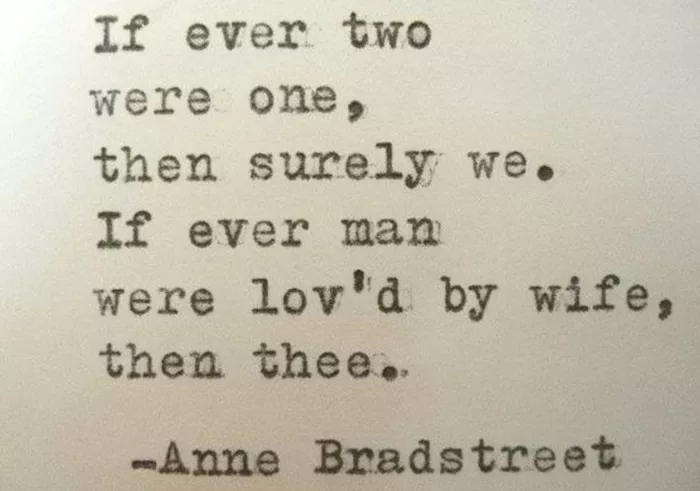Welcome to Poem of the Day – My Thankful Heart With Glorying Tongue by Anne Bradstreet.
Anne Bradstreet, one of the earliest American poets, is renowned for her heartfelt and deeply personal works. Her poem My Thankful Heart With Glorying Tongue reflects her faith, gratitude, and introspection. This article explores the meaning and themes of this poem, presenting a clear explanation of its lines and the poet’s intent.
My Thankful Heart With Glorying Tongue Poem
My thankfull heart with glorying Tongue
Shall celebrate thy Name,
Who hath restor’d, redeem’d, recur’d
From sicknes, death, and Pain.
I cry’d thov seem’st to make some stay,
I sovght more earnestly;
And in due time thou succóur’st me,
And sent’st me help from High.
Lord, whilst my fleeting time shall last,
Thy Goodnes let me Tell.
And new Experience I haue gain’d,
My future Doubts repell.
An humble, faitefull life, O Lord,
For ever let me walk;
Let my obedience testefye,
My Praise lyes not in Talk.
Accept, O Lord, my simple mite,
For more I cannot giue;
What thou bestow’st I shall restore,
For of thine Almes I liue.
My Thankful Heart With Glorying Tongue Explanation
Anne Bradstreet and Her Poetry
Anne Bradstreet was a Puritan poet who lived in the 17th century. She was one of the first women to publish poetry in America. Her works often explored themes of family, faith, love, and the struggles of life in the New World.
Bradstreet’s poetry is deeply reflective of her religious beliefs, often expressing gratitude to God even during difficult times. Her ability to combine personal emotion with spiritual reflection makes her poetry timeless.
Overview of My Thankful Heart With Glorying Tongue
In this poem, Bradstreet uses her gratitude toward God as the central theme. The title itself reflects her intention: to express thanks with her heart and glorify God with her tongue. The poem reads like a prayer, offering praise for divine blessings and acknowledgment of God’s grace in her life.
The structure is simple, yet the language is rich with biblical references and Puritan ideals.
Line-by-Line Explanation
“My thankful heart with glorying tongue / Shall celebrate Thy name,”
In these opening lines, Bradstreet sets the tone of the poem. Her heart is filled with gratitude, and she promises to use her words to honor God. This reflects the Puritan belief in living a life that glorifies God in every action.
“Who dost Thy wondrous acts proclaim / And steadfast laws ordain.”
Here, she marvels at God’s creations and His divine laws. The “wondrous acts” refer to the miracles and blessings seen in the world, while “steadfast laws” symbolize the unchanging and eternal nature of God’s commandments.
“The heavens by Thee established were, / By Thee was earth’s foundation laid;”
Bradstreet highlights God’s role as the Creator. This imagery aligns with biblical accounts of creation, reminding readers of God’s omnipotence.
“The whole creation’s subject to Thy care, / And all shall Thy commands obey.”
These lines emphasize God’s sovereignty over all things. Bradstreet reflects the Puritan belief that every part of creation exists under God’s control and should live according to His will.
“Thou speak’st, great God, and it is done; / Confusion turns to order fair;”
This couplet portrays the power of God’s word. Bradstreet expresses awe at how chaos transforms into order through divine intervention, echoing the biblical creation story in Genesis.
“Thy wisdom’s vast, Thy goodness sure, / Thy glory shines in every sphere.”
Bradstreet praises God’s infinite wisdom, goodness, and glory. She acknowledges that God’s presence is evident in every part of the universe.
Themes in the Poem
1. Gratitude
Gratitude is the core theme of this poem. Bradstreet’s heartfelt thanks to God permeate each line, illustrating the importance of acknowledging divine blessings.
2. Faith and Worship
The poem is a testament to Bradstreet’s unwavering faith. Her words are an act of worship, reflecting the Puritan ideal of glorifying God in all aspects of life.
3. God as Creator and Sustainer
Bradstreet repeatedly refers to God’s role in creating and sustaining the world. This theme reinforces her reverence for His power and wisdom.
4. Order in Chaos
The transformation of confusion into order symbolizes divine intervention. Bradstreet suggests that God’s guidance brings clarity and structure to life’s challenges.
Style and Language
The poem is written in a formal, yet accessible style. Bradstreet’s use of simple rhyming couplets makes the poem easy to follow while maintaining a lyrical quality. The language is deeply spiritual, with many biblical allusions. Despite its religious tone, the sincerity of her gratitude is relatable to readers of all beliefs.
Relevance Today
Although written in the 17th century, My Thankful Heart With Glorying Tongue remains relevant. Its universal themes of gratitude and faith resonate with readers who seek comfort and inspiration. In a world that often feels chaotic, Bradstreet’s reflection on divine order provides hope and perspective.
Conclusion
Anne Bradstreet’s My Thankful Heart With Glorying Tongue is a beautiful expression of gratitude and faith. Through simple yet profound language, she captures the essence of divine praise and the human connection to God. This poem serves as a reminder of the power of thankfulness and the importance of finding peace in life’s blessings. Bradstreet’s timeless words inspire readers to reflect on their own lives, encouraging gratitude and the recognition of order amid chaos. Her legacy as a poet of faith and emotion continues to shine through this remarkable piece.

